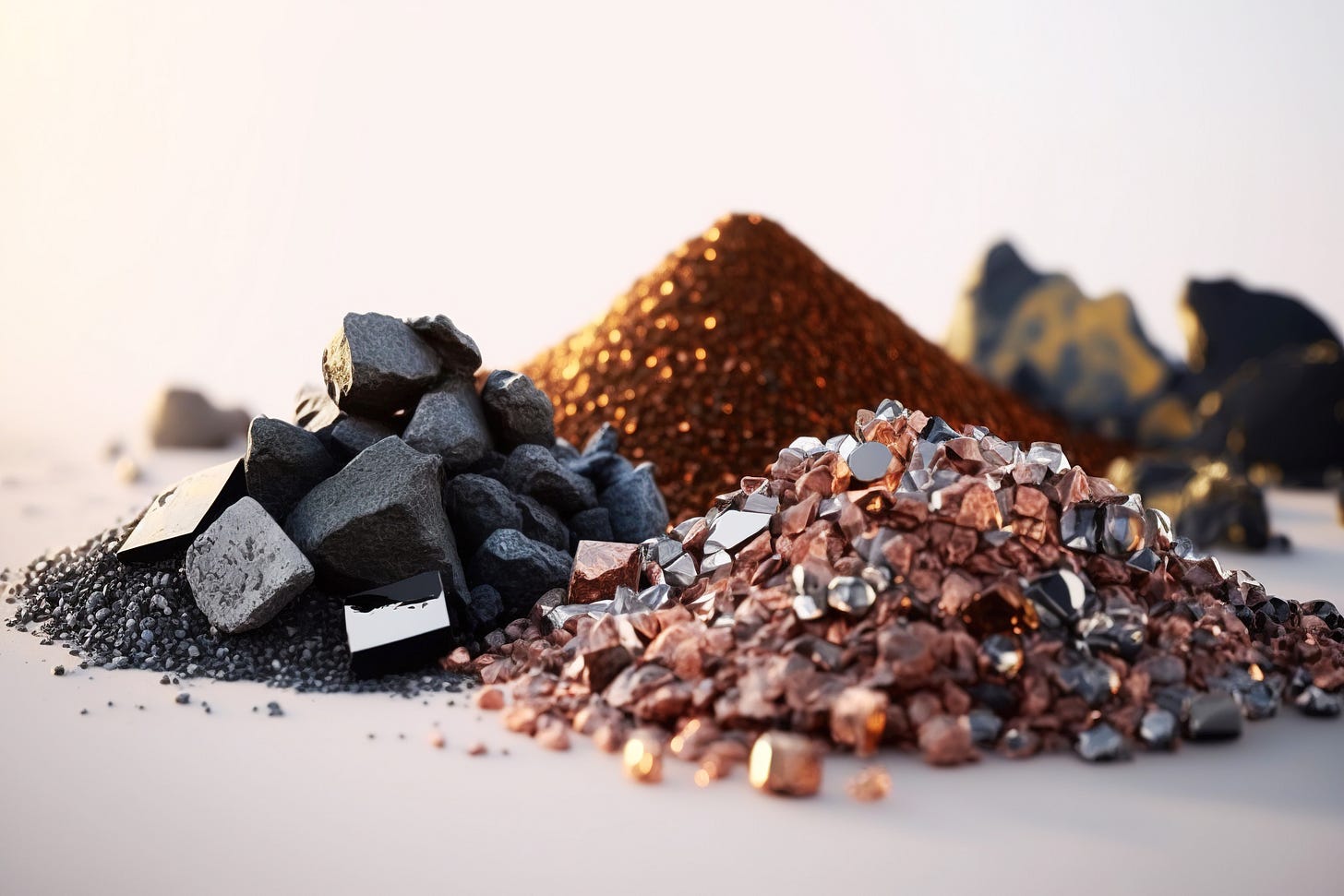Business Developments - Strategic Minerals
Geopolitical competition and pressure to diversify supply chains fuel investor interest in Africa
Here’s what’s on 14 North’s radar this week: strategic minerals—namely lithium, copper, rare earth elements, and other minerals used in renewable battery production and national security technologies. Growing competition between the West and China and pressure to diversify supply chains have ignited interest in African countries with those resources. 14 North is looking at trends and patterns and how they impact future opportunities and risk.
Recent Foreign Policy and Financial Times articles focused on diversification and resilient supply chains. The West’s access to these critical minerals is a crucial topic. The Financial Times focused on the global lithium supply crunch, driven by the rising demand for electric vehicles and renewable energy, highlighting the importance of lithium for Western and African countries, including Namibia, Zimbabwe, and the Democratic Republic of Congo. The graph from the Financial Times shows opportunities—and where we need to focus.
Speaking of Zimbabwe, in his weekly column in the Sunday Mail, President Emmerson Mnangagwa criticized the U.S. Countering Malign Russian Activities in Africa Act and accused Washington of using legislation to monitor and exploit African natural resources. Mnangagwa’s comments reflect the growing concern among African leaders about foreign interference in the continent’s resource management.
Given Mnangagwa’s criticism, it’s no surprise that China is the dominant player in Zimbabwe’s lithium industry, with several Chinese companies investing heavily in its lithium reserves. Firms such as Tshingshan and Zhejiang Huayou Cobalt lead the charge. This increasing involvement reflects China’s expanding influence in African mining industries and its focus on securing critical minerals.
Recent business develops to watch:
Australia’s Atlantic Lithium began drilling at the Ewoyaa lithium project in Ghana. The drilling is part of the ongoing 2023 exploration and resource drilling programs at the Cape Coast Lithium portfolio.
China-based Huayou Cobalt made a US$ 1.67 million investment in Australia-listed Askari Metals to advance the exploration of its Uis lithium project in Namibia. Huayou will assist Askari with technical matters and exploration guidance.
Australia’s Prospect Resources discovered a new lithium deposit during its ongoing exploration program in Namibia. The deposit is in the Lofdal Lithium-Tantalum Project, a joint venture between Prospect and Namibia Critical Minerals. This could potentially increase the country’s lithium production capabilities. Separately, Namibian members of Parliament have been expressing concern at the lack of mining benefits for local populations.
Australia’s Walkabout Resources secured US$ 20 million in funding to complete its Lindi Jumbo Graphite Project in Tanzania. The funding comes from a debt facility the CRDB Bank of Tanzania provides. Walkabout can now finalize the project’s construction and move toward production. The project will produce high-grade graphite concentrates in high demand for lithium-ion batteries.
UK-based Rainbow Rare Earths announced progress at its Phalaborwa rare earth project in South Africa, with commercial production expected to begin in 2026. The project seeks to extract and separate rare earth elements from gypsum stacks at the site. Construction of the pilot plant has started, and the company anticipates it will be operational by Q4 2023.
Australia-based Ionic Rare Earths announced definitive feasibility study (DFS) results for Uganda’s Makuutu Rare Earths Project. The company could receive the mining license in Q2 2023.
Canada’s Deep South Resources won a court case to renew its license for the Haib copper project in Namibia, overcoming a hurdle in the company’s efforts to develop the significant copper deposit. The successful outcome of the legal dispute is expected to boost Deep South Resources’ prospects, allowing the company to advance the Haib project and capitalize on the increasing global demand for copper, driven by the expanding green energy and electric vehicle sectors.
Canada-based NextSource Materials is nearing production at Madagascar’s Molo graphite mine. The company plans to produce 17,000 tons of flake graphite concentrate in the first few years and could achieve up to 150,000 after completing Phase 2 construction.
Canada’s Global Atomic Corporation raised US$ 41 million to advance the Dasa Uranium Project in Niger. They closed a bought deal prospectus in late March, with plans to extract uranium-bearing ore by the end of 2023.
French nuclear company Orano has signed an agreement with the government of Niger to explore the potential of a uranium deposit in the African nation. Under the terms of the deal, Orano will conduct exploration activities for three years to assess the feasibility of mining the deposit, contributing to Niger’s growing mining sector and potentially strengthening the country’s position in the global uranium market. However, concerns have been raised in Niger due to millions of tons of partially radioactive waste from previous uranium mining operations, leading to calls for stronger environmental regulations and waste management practices to minimize potential health and environmental risks.
The Democratic Republic of Congo and its leadership are important to watch, given its leading role as a source of strategic minerals. In March 2023, President Felix Tshisekedi announced a significant cabinet reshuffle, bringing in former Vice President Jean-Pierre Bemba as the new Defense Minister and Vital Kamerhe as the Economy Minister. This move comes ahead of the country’s elections. It aims to strengthen the nation’s defense and economy, showcasing Tshisekedi’s efforts to build a strong government and address the DRC’s various challenges.
Tshisekedi’s reshuffle also brings controversy due to Bemba’s and Kamerhe’s past legal issues and political affiliations. Bemba, the new Defense Minister, is a former warlord previously convicted by the International Criminal Court (ICC) for war crimes and crimes against humanity. However, his conviction was later overturned on appeal in 2018.
Kamerhe, the new Economy Minister, has faced legal troubles as well. In 2020, he was convicted of embezzling over $50 million in public funds and sentenced to 13 years in prison. However, authorities released him in 2022 on health grounds.





